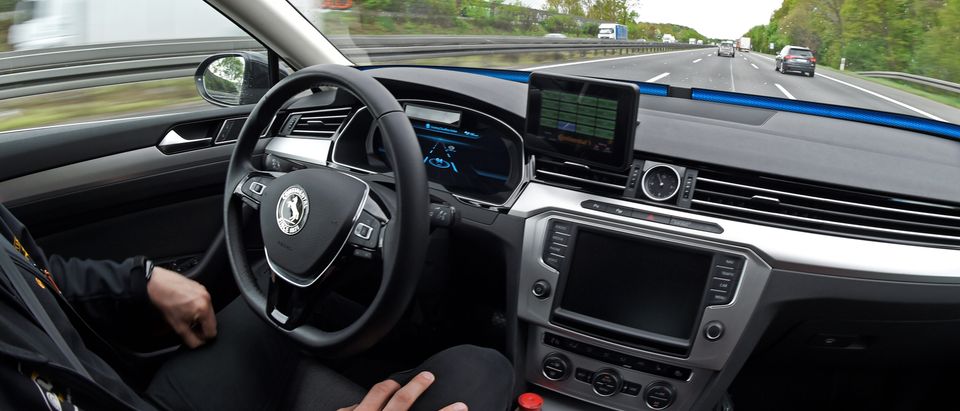Most Americans correctly view the power and influence of Big Tech with growing concern.
COVID exposed the unholy alliance between the government and Big Tech moguls who worked hand in hand to censor the views of thousands of Americans, many of whom were merely promoting the truth. President Trump, whom I worked for in the White House, has been a high-profile victim, having been banned and censored from Facebook, Google, and Twitter, so much so that he sued them.
While Big Tech’s censorship regime is clearly one of the most important issues of our time, it’s not the only way in which these Silicon Valley tyrants have abused their power over the American people.
Big Tech companies have routinely tracked, stored, collected, and sold users’ data without their consent. The issue has gotten so bad that, as of April, anyone who has used Facebook in the last 16 years has been eligible to file a claim for a piece of the $725 million settlement pot Facebook agreed to pay out to settle privacy violations.
Thankfully, Congress is finally working to protect Americans from Big Tech’s clear violation of their rights. The House Energy and Commerce Committee even passed a bill with nearly unanimous support last year that, if passed by the full Congress, would give consumers more control of their personal data in this digital age. That is long overdue.
However, the threat emanating from Big Data today is like Hydra in Greek mythology — when Congress cuts off one of its heads, two more emerge.
So while Congress may have advanced the American Data Privacy and Protection Act to protect the American people’s private information, a new data privacy issue has already arisen. It involves a new piece of technology that similarly travels with the American people everywhere — their autonomous vehicles.
The fancy self-driving cars that are becoming more and more commonplace on America’s roadways are equipped with various sensors and technologies that enable them to collect significant personal data from drivers. These vehicles often have built-in cameras, microphones, LiDAR systems, radar sensors, and GPS trackers, which capture data about the vehicle’s surroundings and the driver’s actions. For example, the cameras may record images of the driver’s face and gestures while the GPS tracker collects location data. The vehicle’s onboard computer analyzes and stores data related to acceleration, braking, speed, and other driving behaviors.
University of Washington School of Law professor Ryan Calo told Newsweek that automakers are increasing the amount of information they’re collecting, “trying to figure out if you’re tired and beginning to close your eyes. Or you’re yawning. Where you’re actually looking. Are you looking at the street? Are you looking at the console?”
Worried yet?
What makes this even more egregious is that most automobile owners have no idea that their cars are constantly recording and tracking their every movement.
Fortunately, there is a solution — giving consumers ownership of their data. If that were to occur, consumers wouldn’t have to worry about car companies weaponizing their data against them for profit in the same manner that Big Tech has been doing.
With tech companies, which are essentially nothing more than data collection vortexes, now more valuable than Ford, GM, and Chrysler, it’s easy to see why automakers want to jump into the data collection game. With large portions of the car companies’ profit coming from their financing operations rather than their manufacturing and sales operations, it should be no surprise the big car manufacturers see data collection as a new cash cow.
General Motors recently announced an optimistic profit outlook partly because of “new software and data-focused businesses.” Ford’s CEO has made similar claims about transforming the company into a tech company.
Drivers need privacy protection. The conversations in your car should not be used as marketing fodder. Your entertainment preferences shouldn’t make you a target for ads. Your travel designations should remain just that – personal.
That’s why you should control this data. Consumers should have total control over what data they’re comfortable with being collected. Not your car company.
You bought the car. You created the data and information within it. Why shouldn’t you control it?
Like with Big Tech, data breaches already happen with significant frequency in the auto industry, leading to multi-million dollar settlements with drivers. They don’t have an interest in protecting this data like you do.
The congressional committee that has jurisdiction over this issue includes Republican Reps. Gus Bilirakis of Florida, Tim Walberg of Michigan, Kelly Armstrong of North Dakota, and other strong conservatives who have all pledged to protect their constituents from large corporate interests that care little about your inherent right to privacy. They’re holding a hearing on autonomous vehicles next week, and it’s vital that they demand automakers agree to give their drivers complete and total control of this data. Demanding anything less would amount to creating another data vacuum that’s as damaging and encompassing as Big Tech’s. We can’t have that.
Andrew Surabian is a Republican strategist and an adviser and spokesman to Donald Trump Jr. He served previously as a special assistant to President Trump and deputy strategist in the White House.
The views and opinions expressed in this commentary are those of the author and do not reflect the official position of the Daily Caller.


